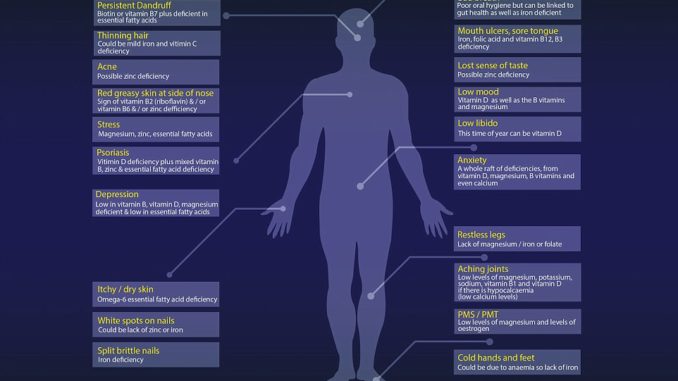
Vitamin B6: This vitamin is known to help control levels of an amino acid in the blood that is linked to heart disease. Therefore, people who do not get enough B6 in their diet are believed to have a higher risk of heart disease. However, a lack of this vitamin is considered rare in the Western world.
How much do you need? Adults under the age of 50 are required to get 1.3mg in their diet each day – the same as three pork chops.
Vitamin B12: Symptoms usually develop gradually but can worsen if the condition goes untreated. It can lead to heart palpitations, bouts of diarrhea and even vision loss, according to research. Getting enough B12, which comes from milk and eggs, is a specific concern in the vegan diet.
How much do you need? Adults need 2.4mcg of vitamin B12 each day. This is the equivalent of slightly more than two eggs.
Vitamin C: According to the NHS, the symptoms of scurvy usually begin three months after a person stops getting enough vitamin C in their diet. Left untreated, scurvy can cause potentially fatal heart problems. This is rare in Britain, but smokers are known to be at a higher risk.
How much do you need? Adults should aim to consume 40 mg per day – the same amount as slightly less than one whole orange.
Vitamin D: This regulates the amount of calcium and phosphate in the body, both needed for healthy bones, teeth and muscles. But research is showing it has many other health effects – and may protect against a number of diseases. Official figures show 23 per cent of adults are deficient in Britain.
How much do you need? Children over the age of one and adults need 10mg daily – a similar amount to that found in one whole salmon fillet.
Zinc: A zinc deficiency can weaken the immune system and slow wound healing. It may also cause tiredness. It is also more common in older people, those living in care homes, and in those who take drugs to lower blood pressure. However, having too much zinc could have be damaging.
How much do you need? Everyone over the age of 14 should try to consume 11mg of zinc each day – which can be found in two raw oysters.
Iron: This is believed to be the most common deficiency in the US. It can lead to anaemia – a condition where a lack of iron in the body leads to a reduction in the number of red blood cells. If left untreated can lead to heart failure.
How much do you need? Adults are advised to consume 10mg of iron – but pregnant women should get more. This amount could be found in a 300g steak, 100g of spinach and around four slices of white bread.
Magnesium: This little-heard-of deficiency is surprisingly common among women – one survey found one in ten suffers from it, but some experts cite figures as high as seven in ten – and the effects can be devastating. Left untreated, it can lead to seizures.
How much do you need? Adults are recommended to consume around 400mg of magnesium daily. This can be found in 100g of dark chocolate, one avocado and slightly more than an ounce of almonds.
Calcium: The body uses this mineral to help build strong bones and teeth. As a result of a deficiency, humans are prone to developing diseases like osteoporosis – giving them fragile bones. It is estimated that three quarters of adults in the US lack enough calcium in their diet.
How much do you need? The World Health Organization recommends adults get 500mg daily – this can be found in around one cup of milk and two ounces of sardines.
CRACKED LIPS
What it could be a sign of: Iron or vitamin C deficiency
Foods that may help overcome it: Red meat, red peppers, kale and tofu
DANDRUFF
What it could be a sign of: Biotin, vitamin B7 or essential fatty acids deficiencies
Foods that may help overcome it: Fresh salmon, almonds, peanut butter and sunflower seeds
THINNING HAIR
What it could be a sign of: Iron and vitamin C deficiency
Foods that may help overcome it: Lemons, kiwi fruit, strawberries and red kidney beans
PSORIASIS
What it could be a sign of: Vitamin D, vitamin B, zinc or essential fatty acid deficiency
Foods that may help overcome it: Eggs, prawns, fresh tuna, mushrooms
DRY SKIN
What it could be a sign of: Omega-6 essential fatty acid deficiency
Foods that may help overcome it: Sunflower seeds, pine nuts, sesame seeds and turkey mince
ACNE
What it could be a sign of: Zinc deficiency
Foods that may help overcome it: Crab, spinach, cashew nuts and cocoa powder
@from DailyMail.com
Leave a Reply